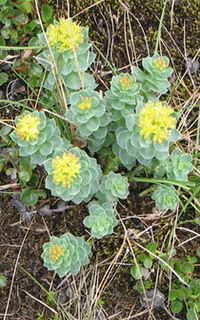 I came across this website and a review that recite the purported benefits of Rhodiola rosea (Sedum roseum; rose root). The story is remarkably similar to the story told at almost all other sites. (Google “Rhodiola rosea” to see what I mean.)
I came across this website and a review that recite the purported benefits of Rhodiola rosea (Sedum roseum; rose root). The story is remarkably similar to the story told at almost all other sites. (Google “Rhodiola rosea” to see what I mean.)
But what does the research really reveal?
Here’s the typical Rhodiola rosea/adaptogen story.
- Adaptogens counteract adverse physical, chemical, and biological stressors by generating nonspecific resistance.
- Rhodiola rosea grows in northern climates; therefore, it had to adapt and be rugged to survive.
- We take advantage of its rugged constitution to increase our stamina.
- How it works is not clear.
- But Russians have used it for centuries as a tonic and stimulant, and to increase physical endurance and mental capacity.
- A wealth of laboratory and clinical research is available.
A review from the University of New Mexico concluded, “Several investigations conducted in Eastern Europe have indicated that Rhodiola rosea ingestion may produce such positive effects as improved cognitive [intellectual] function and reduced mental fatigue. Other research from this region has illustrated enhanced endurance exercise performance in both humans and rats.”
However, “Studies conducted in Western Europe and in North America have indicated that Rhodiola rosea may possess substantial antioxidant properties, but have produced mixed results when attempting to demonstrate an ergogenic [increase muscular work capacity] effect during exercise in humans.”
Yes, there are studies with positive results, but the results as they pertain to stressful conditions tend to fall short of documenting better achievement or greater endurance that actually results in a significant outcome (eg, better test scores, improved work outcomes, faster sprints). The studies summarized here come from a reference list in a 30-page review article and a PubMed search (1966-2007). Emphasis is on studies in humans under stress where Rhodiola rosea was used as the sole treatment.
2002 (men living at high altitude)
- 24 men living at high altitude (5,380 meters) for 1 year were randomly assigned to take Rhodiola rosea, or acetazolamide (Diamox; used to treat acute mountain sickness), or both.
- Oxygenation of red blood cells and sleep improved significantly compared to the start of the study in all groups.
- There was no difference between treatments.
The bottom line?
- There’s no evidence that the men required treatment, or functioned better after treatment.
- A more recent study of cyclists (presumably at sea level) found no change in oxygenation of red blood cells by Rhodiola rosea.
- Another study of 15 volunteers reported that Rhodiola rosea did not have a significant effect on blood oxygenation after 60 minutes of sedentary hypoxic exposure.
- It also appeared not to increase oxidative stress compared with the control period in the same group.
2000 (mental performance in physicians working nights)
- 56 volunteers took 2 weeks of placebo and Rhodiola rosea in random order.
- Significant improvement with Rhodiola rosea was reported in total mental performance and overall level of mental fatigue, which involved perceptive and cognitive cerebral functions, such as associative thinking, short-term memory, calculation and ability to concentrate, and speed of audio-visual perception.
The bottom line?
- Not clear how these improvements related to improved diagnostic accuracy or fewer prescribing errors.
- It’s not stated in the abstract if there was a significant difference in response between Rhodiola rosea and placebo.
- In another study of the capacity to do mental work, Rhodiola rosea-treatment was associated with less fatigue but no change in physiological or psychometric tests.
2000 (students taking exams in Russia)
- Foreign students were studied during an examination period.
- Rhodiola rosea and the placebo were taken for 20 days.
- Significant improvement with Rhodiola rosea was seen in physical fitness, mental fatigue, and neuromotor (eg, reaction time, hand coordination) tests.
- General well-being was also significantly better during Rhodiola rosea treatment.
The bottom line?
- There was no significant difference in the correction of text tests.
2000 (high school students)
- Rhodiola rosea increased the amount of veloergometric (aerobic) work accomplished and reliably increased the kinesthesiometric (muscle) sensitivity.
- Rhodiola rosea also lead to a marked “increased in the general condition” and a decrease in the level of psychic fatigue and situational anxiety.
The bottom line?
- No mention if they got higher test scores, or made honor role, or actually accomplished anything that might be measured objectively.
2004 (exercise performance)
- 24 volunteers were evaluated 1-hour after a single dose and again after 4 weeks of Rhodiola rosea.
- A single dose of Rhodiola rosea improved endurance exercise capacity in young healthy volunteers, but not after a 4-week treatment with Rhodiola rosea.
The bottom line?
- ???
It seems clear that taking Rhodiola rosea has an effect on research-based outcomes under the right circumstance. But it’s not at all clear that it makes a difference in the day-to-day accomplishments of the people who take it.
What’s the correct dose? What’s the correct regimen? Who benefits most (least)? Is it asking too much for definitive answers after more than 140 studies over 40 years?
8/18/07 18:39 JR